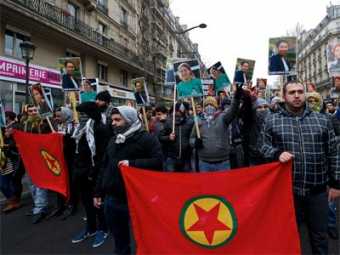Abdullah Ocalan, the imprisoned leader of the Kurdistan Workers’ Party (PKK), which has waged a 28-year war against the Turkish state, is an unlikely candidate for peacemaker. Yet recently he has become Ankara’s key ally in its efforts to end the three-decade-old armed struggle.
 On December 28, Turkish prime minister Recep Tayyip Erdogan announced that Turkey’s National Intelligence Organization (MIT) had been holding talks with Ocalan in an attempt to convince the PKK to lay down arms and withdraw from Turkish soil. As part of the new initiative dubbed the “Imrali Process,” after the island where Ocalan is serving a life sentence, three members of the pro-Kurdish Peace and Democracy Party (BDP), were allowed to visit Ocalan this past weekend to assess his position on the peace talks.
On December 28, Turkish prime minister Recep Tayyip Erdogan announced that Turkey’s National Intelligence Organization (MIT) had been holding talks with Ocalan in an attempt to convince the PKK to lay down arms and withdraw from Turkish soil. As part of the new initiative dubbed the “Imrali Process,” after the island where Ocalan is serving a life sentence, three members of the pro-Kurdish Peace and Democracy Party (BDP), were allowed to visit Ocalan this past weekend to assess his position on the peace talks.
The broad outlines of the roadmap inked between Ocalan and the MIT are said to include a declaration of ceasefire by the PKK next month during Kurdish New Year celebrations, a possible release of Turkish hostages held by the PKK and a withdrawal into Northern Iraq in August after laying down their arms. In return, the Turkish government is expected to craft legislation to overhaul the current definition of terrorism, which would pave the way for the release of hundreds of imprisoned Kurdish activists.
The government is also expected to adopt constitutional reforms removing obstacles to Kurdish language education, a long-time Kurdish demand. In addition, it is expected to agree to strengthening local administrations and embracing an ethnically neutral definition of citizenship.
Ocalan seems to have toned down Kurdish demands for “democratic autonomy”, the most contentious of all Kurdish demands and a non-starter for Turkey. Since 2011, the PKK has officially demanded “democratic autonomy” but even the Kurdish activists admit it is a vague term that is not empirically grounded. Other Kurdish demands include general amnesty for PKK fighters and the transfer of Ocalan to house arrest. The government dismisses claims that these significant concessions on Turkey’s part are on the agenda but analysts argue that for the talks to succeed, the outcome is likely to address these and other contentious Kurdish demands.
The current initiative is not the first government effort to negotiate with the PKK. Ankara started secret negotiations with the PKK after 2005, culminating in what became known as the “Oslo Process.” During the talks, both the Turkish security forces and the PKK scaled back their offensive operations. The initiative ran aground in the run-up to the Turkish general elections in June 2011, resulting in a reescalation of violence that increased casualties to a level not seen in more than a decade.
This time, however, the talks are being carried out publicly and there are reasons to be optimistic. They have the backing of the main Turkish opposition party, the CHP, the pro-Kurdish BDP, civil society organizations and the mainstream Turkish media. Ocalan stands at the center of the negotiations as a man who appears to have softened his approach after thirteen years of jail and apparently is more willing to play a mediating role. In meetings with BDP members of parliament, the PKK cadres in Europe and Iraq have also expressed their support for the ongoing talks.
Prime Minister Erdogan seems intent on pushing the negotiation process forward and has considerable political capital at his disposal. After a year of heightened PKK attacks that killed more than 700 in fourteen months, a conflict-weary Turkish public is now debating how to solve the country’s bleeding wound. Yet risks abound and past experiences counsel against premature optimism.
The current process is built on the premise that Ocalan wields absolute power over the PKK. The PKK is a large entity with several thousand armed militants, long-established networks in the Middle East and Europe and competing hardline factions. Despite being the leading figure of Turkey’s Kurdish political movement, Ocalan’s grip on the PKK appears to be slipping after thirteen years in jail. Since 2009, the PKK has carried out several attacks to disrupt peace negotiations between Ocalan and the government.
Another challenge in ending the insurgency is that large sums of money are at stake. Since the late 1990s, the PKK’s main sources of financing have shifted from states such as Syria, Greece, Iran and Iraq towards financial independence. Most of the group’s money now comes from the Kurdish diaspora in Europe and drug trafficking. Although reliable information about PKK financing is comparatively scarce, its revenues have been estimated by various countries at tens of millions of dollars annually, monies that are expected to dry up if the Kurdish-Turkish conflict is resolved. With so many profiting from the conflict, it is feared that some radical factions within the PKK may have little incentive for peace.
via Commentary: Is Turkey Ready for a Kurdish Peace? | The National Interest.